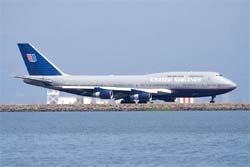Six-year old bankruptcy news sends UA plummeting
10 September 2008
 A howler by the American newspaper South Florida Sun-Sentinel, which published a six-year old report on its website, promptly sent shares of aviation carriers plummeting nationwide, especially affecting the airline named in the article - United Airlines parent UAL Corp.
A howler by the American newspaper South Florida Sun-Sentinel, which published a six-year old report on its website, promptly sent shares of aviation carriers plummeting nationwide, especially affecting the airline named in the article - United Airlines parent UAL Corp.
Shares of UAL briefly plummeted by as much as 776 per cent to as low as $3 early on Monday - from $12.30 on Friday - after a 6-year-old story on the company's 2002 bankruptcy filing resurfaced on the Web and was reported as news by an investment letter.
 The shares did bounce back after the market realised the report wasn't current, although the magnitude of the decline may underscore the lack of confidence investors have in UAL and the troubled airline industry in general.
The shares did bounce back after the market realised the report wasn't current, although the magnitude of the decline may underscore the lack of confidence investors have in UAL and the troubled airline industry in general.
The airline industry has been battered by soaring fuel prices that have undone much of the progress airlines made during an industry-wide restructuring.
UAL, US Airways, Delta Air Lines Inc and Northwest Airlines Corp have each reorganized in Chapter 11. But persistently high fuel prices have eroded airline earnings and earlier this year analysts began looking at the liquidity positions of airlines for signs of potential insolvency. (See: European Commission clears Delta-NWA merger and United Airlines reports massive Q1 loss - pledges 'fundamental overhaul')
Although UAL stockholders who held onto their shares throughout the day recouped much of their losses, investors who sold at the day's lows are stuck: The NASDAQ Stock Market, where UAL stock is listed, said trades triggered by the erroneous report wouldn't be rescinded. What's more, shares of other carriers, including Continental Airlines Inc. and AMR Corp., the parent of American Airlines, also briefly dived with UAL before rebounding.
UAL blamed the mess on a posting of a 2002 Chicago Tribune article on the South Florida Sun-Sentinel's website. The story then was picked up by Income Securities Advisors, a Florida investment newsletter, and disseminated as a one-line brief over Bloomberg News, triggering a wave of panic selling.
